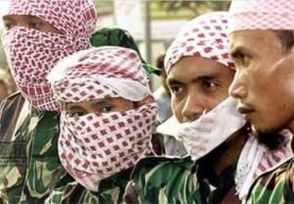Jemaah Islamiya ( JI )

Jemaah Islamiya is an Indonesia based clandestine terrorist network formed in the early 1990s to establish an Islamic state encompassing southern Thailand, Malaysia, Singapore, Indonesia, Brunei, and the southern Philippines. Its operatives, who trained at camps in Afghanistan and the southern Philippines, began conducting attacks in 1999. The network’s existence was discovered in late 2001 when Singaporean authorities disrupted a cell that was planning to attack targets associated with the US Navy. JI is responsible for a series of lethal bombings targeting Western interests in Indonesia and the Philippines from 2000/2005, including attacks in 2002 against two nightclubs in Bali that killed 202 people; the 2003 car bombing of the JW Marriott hotel in Jakarta that killed 12; the 2004 truck bombing of the Australian Embassy that killed 11; and the 2005 suicide bombing of three establishments in Bali that killed 22. A JI splinter group under Noordin Mat Top in July 2009 conducted a suicide bombing at two hotels in Jakarta.
Southeast Asian governments since 2002 have captured more than 300 suspected terrorists, significantly degrading JI’s network. Thai authorities detained JI’s operations chief in 2003. Indonesian police killed JI’s most experienced bomb-maker in 2005 and arrested its two senior leaders in mid 2007. Malaysian authorities arrested two senior JI operatives in Kuala Lumpur in early 2008 and in April 2009 recaptured fugitive Singapore JI leader Mas Selamat Kasteri, who escaped from his Singaporean prison cell in early 2008. Indonesian police in September 2009 killed Noordin Top and in February 2010 disrupted an extremist training camp in Aceh led by former JI operative and Philippines based terrorist Dulmatin, who was implicated in the 2002 Bali bombings. Police killed Dulmatin in March 2010 and continue to pursue fugitives from the camp, including at least 14 previously incarcerated terrorists.
Since 2009, JI’s activities have been overshadowed by the activities of its fragments and other Indonesia based terrorists, some of whom are experienced operatives previously affiliated with JI or convicted terrorists who completed prison sentences and have since resumed their activities. As of May 2010, the Indonesian Government had released 192 detainees convicted on terrorism charges since 2003. Only 13 of 70 terrorists convicted for their role in JI’s attacks from 2002/2004—which killed 238 people—remain incarcerated.
More information about this group
Southeast Asian governments since 2002 have captured more than 300 suspected terrorists, significantly degrading JI’s network. Thai authorities detained JI’s operations chief in 2003. Indonesian police killed JI’s most experienced bomb-maker in 2005 and arrested its two senior leaders in mid 2007. Malaysian authorities arrested two senior JI operatives in Kuala Lumpur in early 2008 and in April 2009 recaptured fugitive Singapore JI leader Mas Selamat Kasteri, who escaped from his Singaporean prison cell in early 2008. Indonesian police in September 2009 killed Noordin Top and in February 2010 disrupted an extremist training camp in Aceh led by former JI operative and Philippines based terrorist Dulmatin, who was implicated in the 2002 Bali bombings. Police killed Dulmatin in March 2010 and continue to pursue fugitives from the camp, including at least 14 previously incarcerated terrorists.
Since 2009, JI’s activities have been overshadowed by the activities of its fragments and other Indonesia based terrorists, some of whom are experienced operatives previously affiliated with JI or convicted terrorists who completed prison sentences and have since resumed their activities. As of May 2010, the Indonesian Government had released 192 detainees convicted on terrorism charges since 2003. Only 13 of 70 terrorists convicted for their role in JI’s attacks from 2002/2004—which killed 238 people—remain incarcerated.
More information about this group
